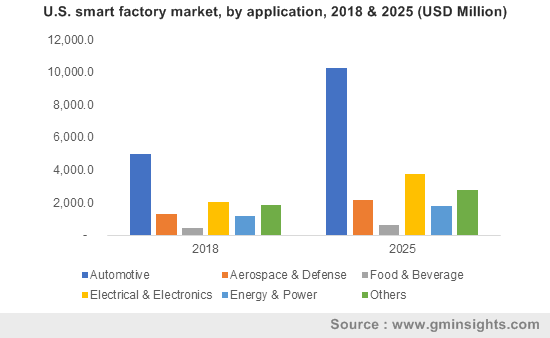Global smart factory market will grow at a significant rate from 2019 to 2025 fueled by escalating demand for intelligent technology solutions to save labor and operational costs.
Publisher : Fractovia | Published Date : 2019-07-11Request Sample
Escalating demand for intelligent technology solutions to save labor and operational costs has fueled the growth of smart factory market extensively. Smart factories are basically aimed at improving work processes with the help self-optimizing and automating machinery. Technology has had a colossal impact on the operations of industrial facilities, helping to enhance manufacturing efficiency through automated systems and tools like analytics, Big Data and IoT. Adoption of advanced sensors and AI-powered equipment will propel global smart factory industry share considerably.
U.S. smart factory market, by application, 2018 & 2025 (USD Million)

Introduction of industrial robots in digitally advanced factories has replaced human laborers for several monotonous and hazardous functions. This has increased the efficiency of workplace, reduced injuries and enabled faster manufacturing of products. Need for cost effective production, without compromising on output, has increased the demand for smart factory solutions in major applications like food & beverage, automotive and electronics, significantly contributing to the development of smart industrial products around the world.
Big enterprises are increasingly investing in smart systems that would help it grow further. Ericsson, a Swedish based multinational telecom has informed that it aims to build its first automated smart factory in the U.S. by 2020. Advanced antenna systems will be produced by the state-of-the-art factory, which will boost coverage and network capacities, along with 5G radios for urban areas. These equipment are deemed necessary for steady 5G deployments, suggesting considerable demand for smart factory market from the electronics segment.
Aerospace and defense sectors would gradually be adapting to the smart factory initiative as agencies are beginning to realize the transformative potential of this industry. The development of cost-effective services and products and making the manufacturing of preexisting products smarter by using sensor and connectivity solutions is picking up pace. Supporting advanced processes like additive manufacturing could further contribute towards the inclination towards smart factory components to build vital aerospace parts.
iBASEt, a software vendor, is collaborating with Amazon Web Services for the latter’s smart factory program that will bring a cloud-based Digital Manufacturing suite through AWS for manufacturers in the aerospace and defense segment. Clients will be allowed to leverage the cloud environment to help achieve better efficiency and control over the digital thread and manufacturing operations. A range of native services are leveraged which will assist in connecting operations, sustainment management and adoption of different technologies in a clear flow of data across product lifecycle and value chain.
Several manufacturing businesses in the European region are integrating digital technologies to tackle high labor cost and enhance operational efficiency. Reports show that Europe smart factory market share had crossed USD 25 billion remuneration mark in 2018. Presence of leading automakers such as BMW, Volkswagen, PSA and Daimler has ensured a consistent demand for automobile parts and sustained the component manufacturing segment in the region, which could augment Europe smart factory industry trends.
Countries like France, Germany and the UK are experiencing remarkable technical developments in the domain of manufacturing and supply chain. Rising demand for passenger and luxury cars is propelling the growth of automotive sector in Europe, due to which numerous intelligent operational capabilities have emerged. Initiatives by private enterprises and the governments have helped in proliferation of industry 4.0, supporting smart factory market forecast.
Under the Industrial Strategy and Made Smarter initiative of the UK government, the country’s first smart factory test bed was recently unveiled. The move is aimed at allowing UK manufacturers to deploy digital solutions to drive productivity and innovation in their companies. The test bed, comprising remote machining activities, augmented reality and artificial intelligence technologies, is to demonstrate the possibility of 30% reduction in defects, 50% productivity benefits and improve time to market by 50%. Similar government initiatives will strengthen smart factory market outlook in the near future.
Key players are constantly involved in the development of novel service technologies and new software which support the robust manufacturing sectors all over the globe. Tremendous investments have been made in support of the activities around research and development of solutions that will cater to automation demands across distinct application segments. Global Market Insights, Inc., estimates that global smart factory market size will surpass USD 155 billion by 2025.